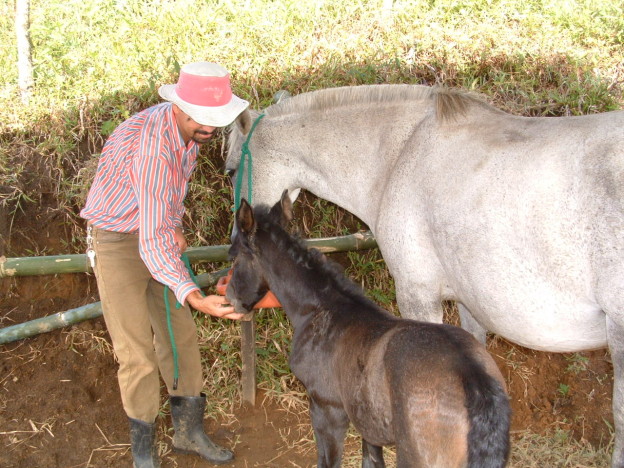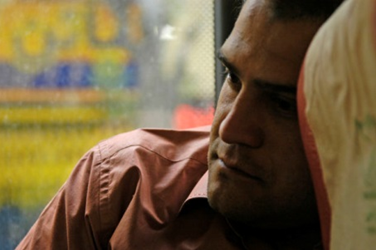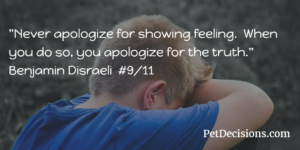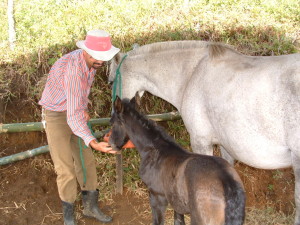Category Archives: Stress

12 Top articles for pet lovers of 2015
If you’re an animal lover—civilian or professional—you know the special relationship we have with our fellow creatures makes our lives, and often theirs, better. Your encounters may be with a loved pet, service dog, store mascot, farm flock, local wildlife, or therapy animal.
All of these can lower your blood pressure and raise your happiness. In fact, the effect is so powerful, scientists study it as a safe way to prevent illness and heal the heart. Well-done studies don’t always show a benefit, but many do.
To celebrate the human-animal bond, here are 12 of my favorite articles from 2015. Some are rigorous research findings. Others tell the story of one kind of animal helping another. All of them will make you smile.
- Tiny stray dog saves dying man. Stray dog and dying man save each other. When this little dog chose their car and jumped in, Bill’s wife was bringing him home from surgery for advanced cancer. Read how they gave each other the strength to go on. https://buff.ly/1AMC47A
- Beneficial effects of animal-assisted visits on quality of life during multimodal radiation-chemotherapy regimens. B. Fleishman, P. Homel, M.R. Chen, V. Rosenwald, V.Abolencia, J. Gerber, and S. Nadesan. Animal assisted visits improved social and emotional wellbeing in patients with head and neck cancer, even as their physical health declined. https://www.ncbi.nlm.nih.gov/pubmed/?term=Bene%C2%80cial+effects+of+animal-assisted+visits+on+quality+of+life+during+multimodal+radiation-chemotherapy+regimens+Stewart+B+Fleishman+et+al
- Kitty compassion: Stray cat saves homeless baby’s life. Samantha Laine. (Article & video) Stray tabby finds abandoned Russian baby in dead of winter, keeps her warm and meows till someone comes. https://www.csmonitor.com/The-Culture/2015/0117/Kitty-compassion-Stray-cat-saves-homeless-baby-s-life-video
- Pet Talk: Human-animal bond a lifeline to those living on the fringes. Monique Balas. Pets keep homeless and mentally ill people grounded, give them a reason to get help. https://www.oregonlive.com/pets/index.ssf/2015/01/pet_talk_human-animal_bond_a_l.html
- The girl who gets gifts from birds. Katy Sewall. Little girl began feeding the neighborhood crows. Now they bring her presents. https://www.bbc.com/news/magazine-31604026
- Horses Helped This Vet With PTSD After No One Else Could. Tim Hayes. Iraqi veteran suffers severe PTSD, tries everything from exercise to diets to 5-mile runs, gets nowhere till she meets a horse on the road. https://www.huffingtonpost.com/tim-hayes/horses-for-heroes-healing_1_b_7425962.html
- Informing Children in a Therapeutic School about the End of Life for the Animals in its Animal-Assisted Education and Therapy Programs; How One Organization Handles this Difficult Process. Miyako Kinoshita. Children at residential treatment and special education facility, who have already lost a lot, learn to handle loss of favorite animals. https://www.latham.org/Issues/LL_15_SP.pdf#page=14
- Ancient bobcat buried like a human being. David Grimm. Rare 2000-year-old burial contains bobcat buried with necklace of bear teeth & shells in human burial mound. The 1-of-a-kind discovery “suggests this animal had a very special place in the life of these people.” https://buff.ly/1NFetcm
- ABC News. (Video).Thoroughbred racehorses get a second career with men who need a second chance. Program in New York saves horses and gives prisoners a way to contribute to society. https://www.facebook.com/abcnews/videos/10153485692358812/
- Meet the therapy dogs who comforted during theater trial. (Video). Carefully trained theapy dogs provided support during trial to families impacted by the Aurora, Colorado mass shooting. https://www.usatoday.com/videos/news/nation/2015/08/13/31528311/
- Psychological stress affects nearly 1 in 10 veterinarians. Phyllis DeGioia. New study shows many veterinarians suffer severe stress, and fear getting help will hurt their career. Happily peer and professional support is growing. https://buff.ly/1MpwHiN
- Pet Dogs and Children’s Health: Opportunities for Chronic Disease Prevention? A. M. Gadomski, M. B. Scribani, N. Krups, P. Jenkins, Z. Nagykaldi, & A. L. Olson. Dogs protect regular kids from anxiety, says major study from Centers for Disease Control. Children with dogs watched as much screen and had the same BMI scores as those without dogs, but had less fear of being alone or meeting people. https://www.cdc.gov/pcd/issues/2015/15_0204.htm
Which human-animal bond stories made you smile this year? Drop Dr. Susan a note here at PetDecisions.com and tell her your favorites and what you’d like to see in 2016.

The secret reason your clients are afraid
There’s a problem in your office that gets in the way of doing what you went into veterinary medicine to do: Make animals well and win the hearts of their caretakers. Your clients are afraid, but not for the reason you think.
What scares clients that you know about
As a veterinarian or technician, you have plenty of conversations with clients that might scare them, at least at first.
They bring their pet in for a simple checkup, and you find a lump. They think their dog has a nosebleed, you suspect cancer. They’re glad their tubby cat has finally lost weight, and you have to tell them it’s diabetes and then explain insulin injections.
You probably have your own special techniques for calming clients when you know they are afraid. Maybe you’ve practiced a Dr. Herriot smile that makes you look wise. Or you have a simple analogy to explain how the brain works. “See, it’s like a lightbulb.” You’ve learned to look for clients’ shoulders to relax when they realize they can pill their cat.
But what about the ones who are going to pieces right in your office? Maybe before you even walk in the room.
What scares clients that you don’t know about
“How can that be?” you ask. You haven’t even looked at their pet, so what are they scared about?
Let’s leave aside the possibility that they came in because they had found something that worried them. And then looked it up on the internet. And asked their Facebook friends what they thought. Assume they were fine till they hit your front door. What could have gone wrong?
Think about off-hand remarks. Overheard complaints. A funny look on the face of one of your co-workers. Or your lengthy silence while you stare into their dog’s eye.
Let me give you an example. Yesterday I went to the dentist for a routine cleaning and partial x-rays. I’m fine with the dentist, but by the time they were done, I needed a neck brace for emotional whiplash.
As we were getting started, I mentioned in passing that my gums were a little sensitive and that a bruisey-looking thing that I’d had for years had gotten swollen last week and was now better. Suddenly they were recommending a full set of x-rays and a quick check by the oral surgeon downstairs. “It could be a dying nerve”, the hygienist speculated as she scurried out of the room. “Dying nerve?”
The oral surgeon, a big middle-aged guy with huge hands, swaggered in, drew on his gloves, and tried to yank my lower lip into the backyard. He jabbed every tender spot and announced it was probably a swollen salivary gland that would take care of itself. “It’s not a tumor except in the broadest sense of the word.” “Tumor?”
“If it gets bigger and really bothers you, we can remove it. Of course with the architecture of your mouth, that would be some surgery.” “Holy cow. The expert thinks this would be ‘some surgery’?” And as he rode out of sight, he tossed off “It’s nothing to lose sleep over.”
Put yourself in my shoes. I came in for a routine event, no drama. But when several professionals looked worried and casually threw around tumors and nerve death, my whole day veered off course like a doomed rocket. It managed to fly straight again for two reasons: 1) The team figured out pretty fast that nothing was wrong; 2) I politely spoke up about how heavy-handed and brusque the consult was. The hygienist acknowledged that it was true and that she’d heard it before.
If your clients speak up about their concerns and ask you questions, you’ll have a chance to clear things up too. But what if they don’t tell you?
What’s the big deal?
A panicking client can’t concentrate on you or make decisions. She’s tuned into the radio station in her head that’s saying, “Run for your life. Martians have landed in New Jersey.”
Clients who feel blindsided by bad news inexplicably refuse to let you do tests. They stall so they can wrap their minds around this potential disaster. If they overhear your staff express curiosity about how this will turn out, your clients seethe because employees seem nonchalant about finding a problem in their pet. They may even feel you manipulated their fears to get them to spend money.
But if you don’t figure out that they are unnerved by something they’ve heard, you won’t know what’s going wrong.
How to fix your clients’ secret fears
Since reading minds is hard, you want to prevent secret fears and intervene if they happen. Here’s how.
- Make your office a calming environment. Use distractions, like music, a TV, or an aquarium to give clients somewhere to focus besides their anxieties.
- If you sense clients are confused, say something like “Let’s pause. Let’s take a break.” Then ask if they have any questions so far.
- Breathe easily as you examine the pet. It will calm everyone in the room.
- Talk as you work, so clients know what you are doing. Incidentally, when clients recognize the time and skill that went into the exam, they are more willing to pay your bill.
- Don’t casually speculate about bad possibilities. Wait till you do at least a brief exam and have some evidence for your assessment.
- Watch what you say where civilians can hear you. Complaints about coworkers, blaming others when you can’t find something suggests this is a badly run place with interoffice drama—not a place you want to trust your pet to.
- At the end of every encounter, review what you did and what the options are. That way, if your clients tuned out for a while to take stock, you have another chance to get through them. If you suspect something you’ve said might disturb them, acknowledge it. “I know this isn’t what you expected when you came in today. It’s a lot to take in. How are you doing with all this?”
If you liked this article, please leave a comment. And if you really liked it, please share the link.
If you’re having client communication problems, Dr. Susan would be happy to meet with you and your staff.
Self-Care for People Who Do It All
Chronic stress and a perfectionist streak can destroy you. Over the long haul you can quit caring–Burn Out–or care so unrelentingly you bleed out emotionally–Compassion Fatigue (CF). With CF you can’t stop yourself from getting involved the problems of others, so to recharge, you overindulge in things that aren’t necessarily good for you, from sugar to shopping. When that doesn’t do the job, you try to keep your energy from leaking away by isolating yourself, not only from friends but from your own body. (For more information on CF, see my blog post, (You feel sooo exhausted. Do you have Compassion Fatigue?
Not only does Compassion Fatigue take a toll on your personal life, it can eviscerate your practice. People with CF feel no one can do as good a job as they do. They work long hours, snipe at others for not working enough, and prevent coworkers from developing new skills and ideas by insisting that their way is the best, and therefore only, way.The things you do to care for patients and their families that should build your practice wind up hurting it.
The good news is, even smart, Type A chocoholics can prevent or treat Compassion Fatigue with these six techniques.
 1. Move around a little, preferably outdoors.
1. Move around a little, preferably outdoors.
Research confirms that even mild exercise is good for your mood as well as well as your health. Regular exercise lessens the worry and the blues that come with setting impossible standards for yourself.Here’s what WebMD says: https://www.webmd.com/depression/guide/exercise-depressionBeing outside in nature for twenty minutes a day makes you feel more alive and energetic. What’s more, outdoors you get a dose of Vitamin D, which fights depression and enhances thinking. Check out this study on nature and mood. https://www.sciencedaily.com/releases/2010/06/100603172219.htm Instead of another double espresso, take a walk around the block. Declare a five-minute dance party.
2. Make sure you sleep seven to eight hours a night.
Americans are sleep deprived. We need it to give our bodies break and to clear the cobwebs from our brains. If you handle your work stress by cruising the internet till the wee hours of the morning, you risk poor thinking, slow reaction time, and trouble learning.
3. Eat healthy food and take time to enjoy it.
You know those doughnuts aren’t good for you, but when you focus everywhere but on yourself, you may take the shortcut to energy and grab a hunk of fried dough smothered in chocolate to give you a boost. The sad part is, you probably won’t even enjoy it. The next time you get hungry, pick something with protein and fiber to sustain you. Then, and this is the hard part, sit down to eat. Before you take your first bite, stop and inhale deeply. How does your food smell? What color is it? Taking a few extra seconds to tune into your senses will not only make the meal more delicious, it will help you reconnect to the body you’ve been ignoring.
4. Talk to your neighbors.
I know, I know, you’re an introvert who needs alone time to re-energize. The problem is, Compassion Fatigue exaggerates your need to escape. You forget how to interact, and the next thing you know, you can’t make conversation even with the ones you love. If that sounds familiar, start small. Greet the receptionist when you come in. Ask the kid bagging your groceries how his day is going. You’ll be surprised at how less alone in the world you feel.
5. Tap a source of strength and inspiration.
We all need a life outside work, and most people benefit from connecting to something that braces us in the bad times and expands our minds when we’re ready. For some this will be a spiritual practice. Others read poetry or keep journals. Simple meditation can put life in perspective and remind you that what is happening in this moment, no matter how important it seems, will pass
6. Work with a counselor.
If you’ve tried the first five techniques and find you still overcommit to work and undercommit to yourself, it’s time to get outside help. Since your situation isn’t new to the profession, many local VMAs and other animal health organizations have support systems in place for veterinarians, technicians, and others who face challenges in their work and personal lives. Veterinary Information Network(VIN.com) has online boards that focus on practice issues and a confidential one, Vets4Vets, for those that want a private channel to find help locally.When you choose a mental health professional, find one who deals with your kind of concerns, one that you connect to personally. If getting through CF were easy, you’d have done it. It’s time to have someone on your side. Ask a friend to recommend someone, check with your physician, call your clergyperson, or see what the community mental health center suggests. You wouldn’t ask your patient to suffer; why should you? Since no one can have all the good ideas, let’s share ours. What do you do restore yourself? What are you doing to avoid Compassion Fatigue?

You feel sooo exhausted. Do you have compassion fatigue?
 Compassion Fatigue is a hot topic in veterinary medicine. Veterinarians and other staff wonder about it when they feel tired or depressed. They are surprised that after they work crazy hours, eat junk food, euthanize pets they remember as babies, get yelled at by clients and coworkers, and watch their income plummet from competition and a bad economy, they feel exhausted. No kidding!
Compassion Fatigue is a hot topic in veterinary medicine. Veterinarians and other staff wonder about it when they feel tired or depressed. They are surprised that after they work crazy hours, eat junk food, euthanize pets they remember as babies, get yelled at by clients and coworkers, and watch their income plummet from competition and a bad economy, they feel exhausted. No kidding!
Many others bleed energy because they are introverts in an extravert world. The veterinary field is full of smart folks who chose animal health over human health because they didn’t want to deal with patients who talk back. The most successful of them can imitate their talkative, outgoing colleagues but then they need to go home and not speak to anyone for the next four hours.
A few secretly hope they have developed some kind of syndrome, because it might confirm how much they care about animals. Besides, it gives them an excuse to tell everyone around them what they really think.
None of this is Compassion Fatigue.
Compassion Fatigue is actually a condition where people invest so much of themselves in taking care of others, that they drain out all their resources. Sufferers feel like a “Volunteer Atlas”. They carry the world on their shoulders because no one else will do it right. They may snap at their coworkers and family, try to avoid upsetting scenes, or start to cry more often.
They tend to isolate themselves, because no one can understand what they are going through. They may also try to restore themselves with methods that don’t help, such as overindulging in alcohol, sweets, shopping, or gambling. Ultimately they may even lose their profession and their family. People with Compassion Fatigue sense they are drowning, but they can’t climb out of the pool.
Sound familiar? Can you relate to these twelve people?
1. Joan has been very upset or tearful because of work stress.
2. Mary avoids TV, movies, newspapers that remind her of scary, upsetting events.
3. Bob mentally takes work home, because he can’t stop thinking about disturbing things he’s seen.
4. Alice has trouble sleeping and has bad dreams about work.
5. Natasha feels that she can’t manage, that her life is out of control.
6. Hank feels cut off from family, friends, and co-workers, or society in general.
7. Barbara is unable to stop giving to others, even though she is sinking herself.
8. John keeps his problems to himself.
9. Fred has given up activities that he enjoys.
10. Gretchen snaps at people.
11. Harry startles easily.
12. Ron and Hermione do more drinking, eating, smoking, sleep aids, shopping, gambling.
Most of you will answer yes to a couple of these from time to time. If you say yes to more than half, especially if you have felt this way for a while, you may also want to schedule sessions with a counselor who specializes in work stress.
The good news is that you can recover from Compassion Fatigue and even prevent it all together. There are many things you can do to take better care of yourself. Send an email for a list of self-care resources. And check out our next blog post for tips on how to find a better work-life balance.You will feel better emotionally and be much happier, and all of that will help you to be successful at work.



